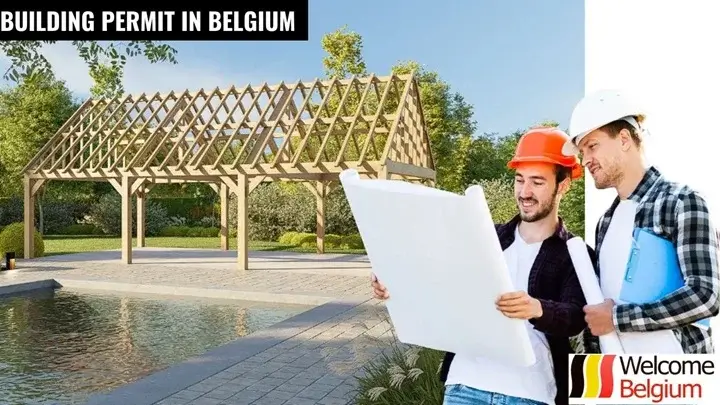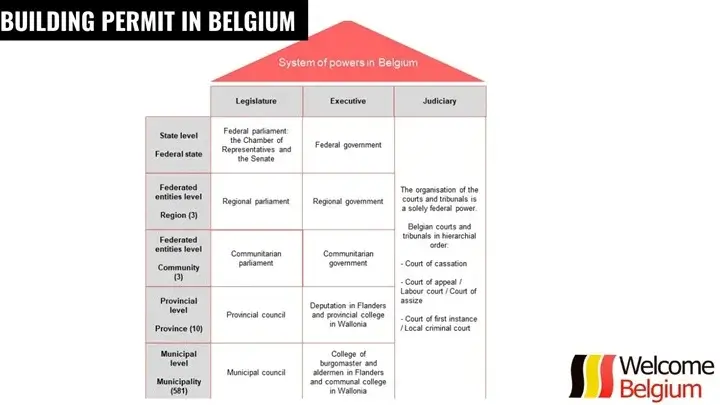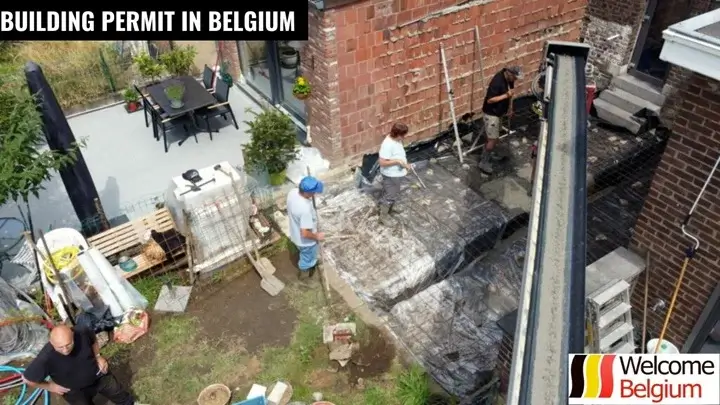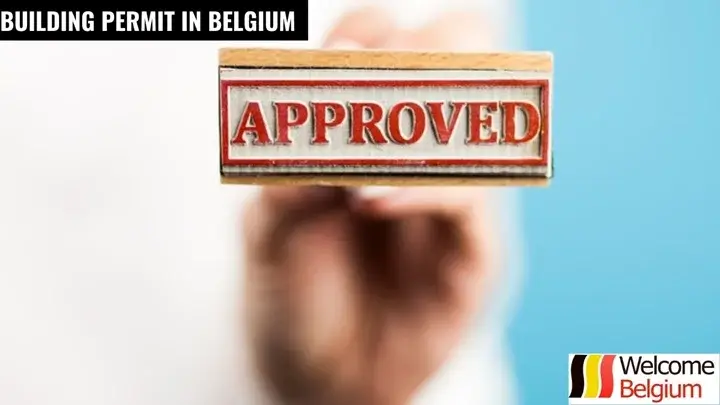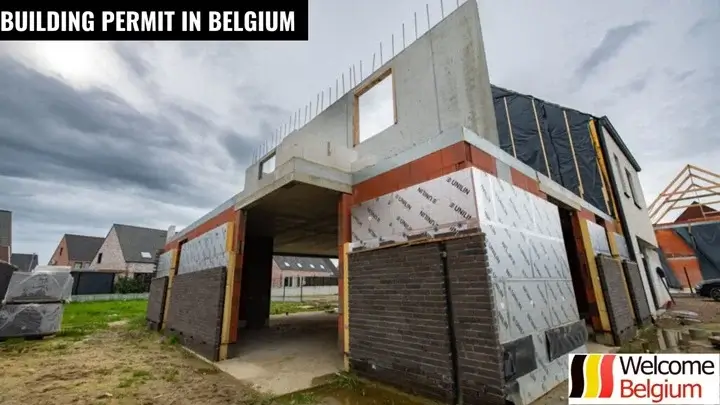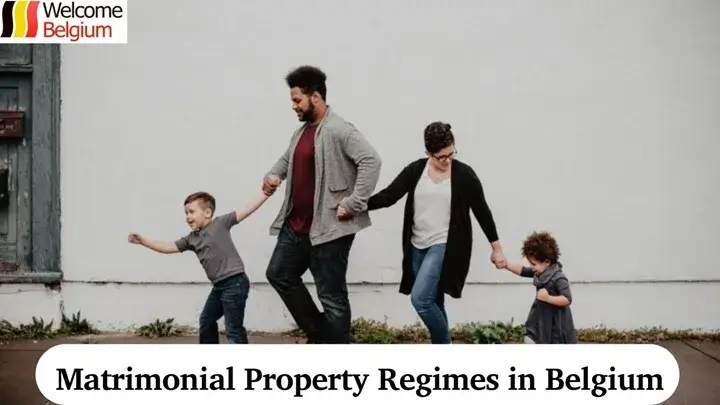Building a new home or renovating an existing one in Belgium requires a mandatory permit. This process is regulated by local authorities and varies by region. To avoid fines and delays, it is important to understand the requirements in advance. In this article, we will look at how to correctly obtain a building permit in Belgium.
What is a building permit in Belgium
A building permit in Belgium is an official document issued by local authorities that allows construction or renovation work to begin. Without this permit, any major construction activity is considered illegal. It is required for both new buildings and significant changes to existing structures.
In what cases is a building permit required in Belgium:
- construction of a new residential building, garage, outbuilding or any capital structure
- major reconstruction with changes in the design, appearance or purpose of the building
- expansion of the total area of a building (e.g. an extension or addition)
- facade modification: installation of new windows, doors, roof replacement, external insulation
- change of purpose of a building (for example, from residential to office or store)
- installation of a high fence (the height can be regulated at the commune level)
- earthworks that affect the topography, drainage or stability of a site
- construction of a terrace, veranda, winter garden or balcony
- installation of solar panels on the roof or ground (permission required in some regions)
- demolition of buildings or structures, especially if they are on the list of protected objects
In some cases, permission may not be required, for example, for minor internal repairs without interfering with the structure of the building. However, it is better to consult with the local administration in advance. A permit is not just a formality, but a tool that regulates the quality and safety of development. It also helps preserve architectural heritage and urban balance.
Important: failure to obtain permission may result in fines, legal proceedings, and even an obligation to demolish the structure.
Types of permits: regional features
Building legislation in Belgium is regulated at a regional level, with each region setting its own rules and procedures. This means that permitting procedures in Flanders may differ from those in Wallonia and Brussels. It is important to check local regulations before starting work.
Main types of permits and features in the regions:
- Flanders:
- The building permit (omgevingsvergunning) includes the building permit and the environmental impact permit
- You can submit an application online through a special regional platform
- Clear rules apply to facades, landscaping, parking and energy efficiency of buildings
- Wallonia:
- Urbanisme permission required for construction or alteration of objects
- In some cases, approval from the commune administration is required.
- There are additional restrictions in rural areas and protected areas.
- Brussels:
- Regulated by the ” CoBAT ” code
- Both paper and digital applications are supported.
- Particular attention is paid to historical buildings, preservation of facades, and building density.
Different regions of Belgium may require different documents and application processing times. This is important to take into account when planning any construction or renovation work. Mistakes in submitting documents or ignoring regional requirements may result in refusal or fines.
Advice: before submitting documents, it is worth consulting with the administration of your commune – they will tell you what rules apply specifically to you.
Procedure for obtaining permission
Obtaining a building permit in Belgium is a mandatory step for most construction and renovation work. The process varies by region, but the basic steps are roughly the same. To avoid delays and refusals, it is important to understand how to apply correctly and what documents are required.
The main stages of obtaining permission:
- Contact your commune administration or regional portal (depending on the region)
- Prepare an architectural project (sketches, plans), project description and technical specifications
- Collect documents: application, copy of passport, land plot documents, photographs of the current state
- Apply: online (Flanders, parts of Brussels) or in person/by post (Wallonia, Brussels)
- Once submitted, public comment may begin, especially if the project affects the interests of neighbors.
- Expect review: 30 to 120 days depending on the region and complexity of the project
- If approved, you receive official permission (and it is valid for a period of time – usually 2-3 years)
The cost of obtaining depends on the region and the size of the project. Typically the fee is between 50 and 300 euros, but may be higher if the project is large. A timely and correctly completed application is the key to successfully obtaining a permit. Having all the documents and preliminary consultations will help to avoid refusals.
Tip: In Brussels and Wallonia, an environmental or energy assessment may be required – take this into account when preparing.
Who is involved in the submission and the project?
Applying for a building permit in Belgium often requires the involvement of specialists. Depending on the nature of the project, this may be the owner of the site, an architect or a construction company. In some cases, it is impossible to do without the help of a licensed architect.
Who is involved in the submission and design:
- The owner of the plot: can apply independently if the project is very simple (for example, installing a fence or a canopy)
- Licensed Architect: A must for any major construction or renovation
- The architect prepares design documentation, monitors compliance with standards and can represent the client’s interests in the administration
- Construction company: can take on all technical and administrative tasks if it has an architect on its staff
- Developer (if we are talking about multi-apartment construction): independently handles the entire procedure from the design to obtaining permits
- Sometimes construction support agencies are used, which help with paperwork, submission and communication with authorities.
In complex cases, it is advisable to contact architects with experience in a specific region. This will speed up the process and help take into account local regulations.
Tip: In most cases, it is the architect who will complete and submit the application – even if you are building for yourself.
What is needed for reconstruction and renovation
Not all construction work in Belgium is considered new construction. Renovations and reconstructions often require a separate permit, especially if the façade, volume or structure of the building is affected. Simple work such as cosmetic repairs can be done without permits, but as soon as load-bearing elements are affected or the external appearance is changed, approval is required.
Documents and permits required for reconstruction and renovation:
- Permission is required when:
- Changes to the facade, including replacement of windows, doors or colors
- Adding additional floors or expanding a building
- Changing the purpose of the premises (for example, from a warehouse to housing)
- Redevelopment involving load-bearing structures
- Work on historically significant buildings
- Permission is not required for:
- Replacing plumbing or electrical equipment
- Painting of interior walls
- Replacing the floor
- Roof replacement while maintaining shape and material (in some regions – upon notification)
- Required documents:
- Application for permission
- Project prepared by the architect
- Description of planned works
- Photo before the renovation began
- If necessary – energy certificate
Different regions may interpret the boundaries of major repairs in their own way, so it is important to check with your local administration.
Important: Changing the facade without permission may result in a fine and an obligation to return everything to its original state.
Possible difficulties and refusal
The process of obtaining a building permit in Belgium can be accompanied by refusals for various reasons. Such decisions are often related to violations of building regulations, improper paperwork, or non-compliance of the project with local regulations. Understanding the typical mistakes and how to avoid them will help increase the chances of a positive decision and correctly file an appeal in case of refusal.
Possible reasons for refusal and ways to avoid them:
- The project does not comply with local building codes.
Research local requirements in advance and consult with an architect. - Missing required documents or errors in the application
Check the set of documents before submitting and use the services of specialists. - Violation of urban planning regulations, such as exceeding the permitted area.
Coordinate the project with local authorities before submitting an application. - Violation of environmental or historical protection regulations
Conduct an impact assessment and obtain additional approvals if required. - Opposition from neighbors or the local community
Try to maintain a dialogue with your neighbors and take their comments into account.
If the decision was negative, an appeal can be filed with the municipality or regional court. To do this, it is important to meet the deadlines and provide additional arguments or corrected documents. Complaints and appeals are considered in accordance with local legislation, so it is recommended to contact lawyers specializing in construction law.
Permit denials are not uncommon, but most problems can be avoided with careful preparation and consideration of all requirements. Proper documentation and consultation with relevant specialists will help you go through the process without unnecessary complications. If you receive a refusal, do not despair – the law allows you to challenge the decision.
Tip: The most common mistake is an incomplete or incorrect application, pay special attention to this.
Fines and consequences of construction without permission
Building without official permission in Belgium can lead to serious problems and financial losses. Local authorities regularly conduct checks and inspections, identifying illegal constructions. Ignoring the rules threatens not only fines, but also dismantling of the object, as well as lawsuits.
The main fines and penalties for construction without permission:
- Fines for illegal construction can reach several thousand euros, depending on the region and the nature of the violation.
- It is possible to demolish a constructed object at the owner’s expense if he is unable to obtain permission retroactively.
- Administrative fines may be imposed on individuals and legal entities, including developers and contractors.
- For repeated violations, fines and penalties become more severe, including the possibility of a ban on further construction.
- Lawsuits may be filed by the municipality or by affected neighbours, leading to additional costs and possible compensation.
It is important to remember that responsibility for illegal construction lies with the owner of the facility and those who carried out the work without permission. Belgian legislation strictly regulates this area, and it is not worth circumventing the rules.
Pre-arrangement of all permits in advance helps to avoid fines and problems. Illegal construction is always associated with risk and serious consequences. If in doubt, it is better to consult with specialists to avoid unnecessary problems.
Advice: sometimes it is more profitable to spend time on paperwork than to pay large fines and demolition of buildings later.
Useful tips and recommendations
This section contains practical advice that will help you correctly and promptly obtain a building permit in Belgium, avoid mistakes and simplify the process.
Question and Answer:
— When is the best time to start applying for a building permit?
It is best to start the process immediately after planning the project to avoid delays and to have time to collect all the necessary documents.
— How not to delay the registration process?
Prepare a full package of documents in advance and consult with an architect or specialist who will help you avoid typical mistakes.
— Where can I get advice on permits?
The local commune (city or municipal government) provides advice and explanations on requirements and procedures.
— Who should you trust to issue the permit?
It is best to contact licensed architects or experienced construction companies who are well aware of local regulations.
— What mistakes do applicants make most often?
They often forget to provide a full package of documents, fill out applications incorrectly, or do not take regional specifics into account.
— What to do if you are refused?
It is recommended to consult a lawyer and file an appeal or correct the deficiencies in the application.
Correct and timely registration of a construction permit is the key to the successful implementation of your project in Belgium. Attentive attention to detail and professional assistance will help avoid complications. If you approach the process responsibly, you can significantly reduce the waiting time and minimize risks.

